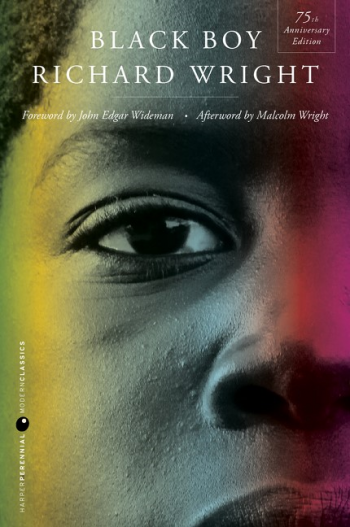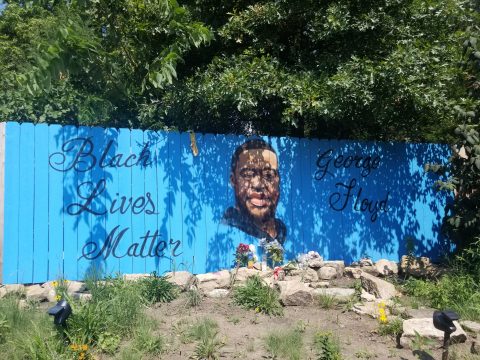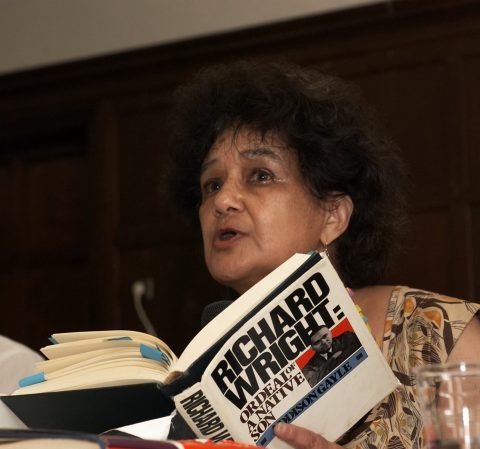This content is being reviewed in light of recent changes to federal guidance.
Richard Wright’s Legacy: Remembering George Floyd – Part 1
Categories: Guest Blogger
In August 2020, members of the Richard Wright family wrote statements regarding the social unrest our country has faced and shared them in the “Richard Wright News Bulletin.” In honor of Richard Wright’s 112th birthday on September 4, 2020, HBW begins a three-part series as an inter-generational family tribute to Wright’s legacy.
Part I

credit: Harper Collins
A world ago, before COVID-19, before Ahmaud Arbery, before Breonna Taylor, before George Floyd, I was tying up my collaboration with Harper Perennial for the preparation of the 75th Anniversary Edition of Black Boy which was published on February 21st. Having obtained a “Foreward” from John Edgar Wideman and knowing that my son had agreed to contribute an “Afterword” to Harper, I sat on a beach for the last time I can remember and searched around for a theme for the “Post Scriptum” space allotted to me at the end of this milestone edition. Word allowance was restricted so I would have to be brief. For some compelling reason, I felt moved to focus on the experience of lynching as half-understood by a small black boy overhearing adults whispering about a graphic, wanton reality and — time slipping forward — remembering that same black boy, who had become my father, angry and restless when the news reached him in his Paris exile that yet another black boy, Emmett Till, had been lynched. The “eeriness” had run almost full circle, but then for us there is no eeriness in these matters : simply, basically the near prescience of death-bound, arbitrarily defined, savage, prescribed but always unannounced, and never abolished danger.

George Floyd Mural by Xavier Martinez, Lawrence, KS. Photo credit: Mona Ahmed
Because of my father’s ability to focus on the taboo theme of lynching from “Between The World And Me” to Black Boy, from Uncle Tom’s Children to The Long Dream, because of his “sense of dread” (as he confided to a correspondent) when confronted with the photo of the lynched Emmett Till in JET Magazine, I wish to dedicate this issue of The “Richard Wright News Bulletin” to George Floyd and all the others going, going, gone.
The Civil Rights icon, John Lewis, who just left us, wrote as he lay dying : “Emmett Till was my George Floyd.” There is only an apparent contrast between the sadistic perfection of the circle of a tightly drawn noose — and the cruel imperfection of absence of closure to the practice of lynching in our country. It is as if we were to attempt to contrast the practice of colonialism with that of neo-colonialism. This double-bind affects, I believe, our very sense of time from one generation to the next, introducing a surreal sense of time slippage, of unfinished circles spiraling. We remain shackled to an inheritance of dread.
Rope-Choke
that unremembered
painful breath
drawn
when born from Mama
you inhaled
fiery air
from the icy white world
for the first time
that last
everlasting breath
withdrawn
when calling for Mama
you choked
as long as it takes
for a rope
to rob you
of your time
Julia Wright June 30 2020

Julia Wright Photo Credit: C.B. Claiborne
During the uprisings that took place after George Floyd’s lynching, not only were the numbers of protesters historically massive (quantitatively more important than at the height of the Civil Rights era), but several generations of a same family were in the street albeit in different areas, cities, countries. This has taken place in my family. Richard’s children, grandchildren and great grandchildren continue to live in the expatriation their ancestor had proudly chosen – albeit in different countries. But this has not prevented three generations of Wrights from coming together to find the words to say what George Floyd means to them.
Julia Wright, August 6th 2020
Julia Wright is the eldest daughter of Richard Wright and the executor of his literary estate.
THE RICHARD WRIGHT NEWS BULLETIN
For years after becoming the literary executor of my father’s estate, I had been toying with the idea of putting out a bulletin updating his legacy. But distractions, in Pascal’s sense of the term, kept intervening. Then three catalysts suddenly made my idle thoughts become a pressing reality : COVID-19, George Floyd, and a message from my grandson. COVID-19 is pushing us to re-appraise our relationship with Time. Our dreams of creativity may well become unborn because we could be overtaken by the unknown at any time. Time nowadays has become a commodity with a short expiry date. Then George Floyd’s agony was forced on us as we woke up from the anesthesia of lock down. The finality of George Floyd’s torture also impacted, I feel, our sense of Time. So many minutes ending such a short life. There was a before and an after. Just as mourning unfolds over time, our loss of George Floyd created a sea change in our time-sensitive agenda, in the literal Latin sense of : How do we define our agency now ? Suddenly, out of the blue, on June 6th 2020, I received an email from my grandson, Maxime Desirat, a child I had been unable to hug for such a long time because he lives a continent away and COVID-19 has shut down so many borders. Mima, he wrote, sorry I was out of touch but here is a message I wrote in response to the protests in the U.S. following the death of George Floyd. As I read his youthful words, I felt he was driven, I also felt his fragilized sense of time. Shortly after, my son, Malcolm Wright, sent in a message as moving as an improvisation of hope on a somber bass beat. Almost organically, I experienced the beginning of a sense of closure. Was it the ingrained memory of families wrenched apart before being auctioned off during slavery ? Was it the remembered reality of black families torn apart by the nighttime departure of its members threatened by lynching ? Was it the recognition that family reunions were an antidote against these attempts to dismember us as a people ?
Part One of this issue of the “Bulletin,” dedicated to George Floyd, uniting our family voices against the odds of racism, the pain of balkanization, the pathos of distance and telescoped time – was born. Other “Richard Wright News Bulletins” follow.
As “The Bulletin’s editor, I hope to open it up to as many voices as possible in tribute to and in positive discussion of Richard Wright, his life, his ideas and literary descendants.
Julia Wright, September 9th 2020
richardwrightcentennial.jw@gmail.com